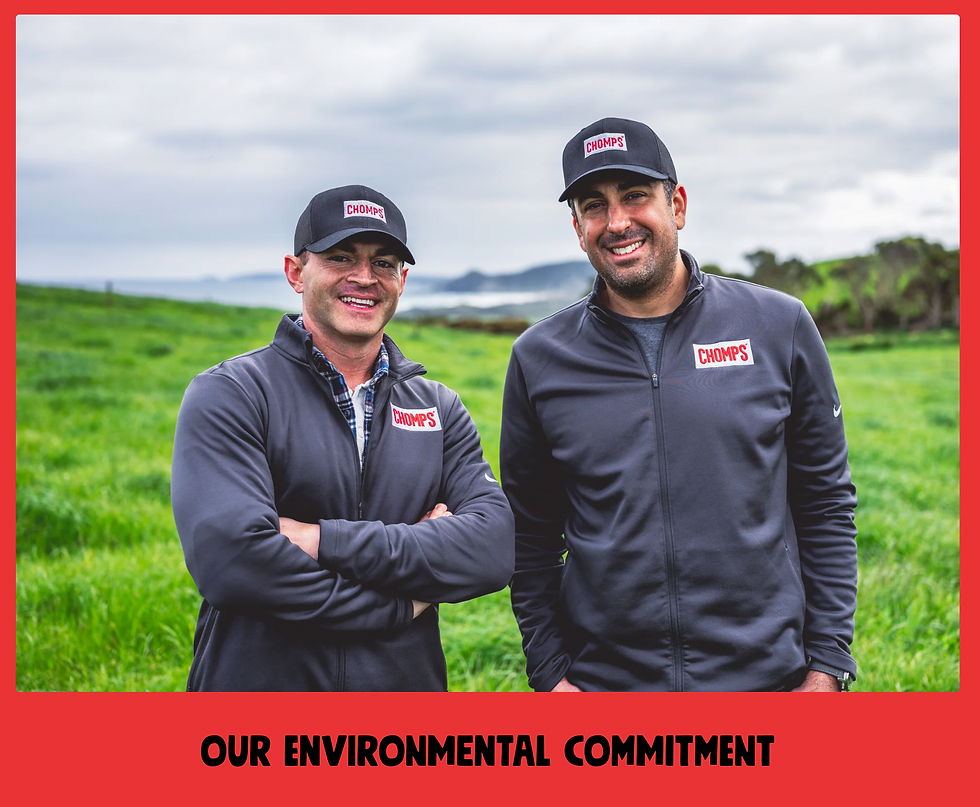In recent years, companies have been evaluated on their financial success and how they affect society and nature. CHOMPS, one of the most prominent figures in the meat snack industry, has taken this to heart by developing comprehensive CSR and ESG programs. This article explores how CHOMPS integrates sustainability, ethical practices, and community engagement into every bite.
Sustainability From The Start
Since its inception, CHOMPS has aimed for a net positive environmental impact. For example, in May 2023, they partnered with EcoCart to make every order carbon neutral, thus demonstrating leadership in battling climate change by eliminating or capturing all carbon emissions created from the production and shipping of CHOMPS products.
Moreover, they continue working towards this goal through their dedication to sourcing high-quality protein that is sustainably produced. This dedication is evident in their close work with farmers practicing natural regenerative agriculture. These partnerships ensure that their animals are treated humanely while promoting environmental stewardship consistent with strong ESG principles.
Regenerative Agriculture: A Foundational Practice
At the center of CHOMPS' sustainability initiatives lies regenerative agriculture - a practice intended to restore entire ecosystems and improve them. This method has many advantages, such as improving soil health, increasing biodiversity, reducing soil erosion, and lowering water pollution levels. Rotational grazing is one technique used within these regenerative agricultural practices where pasture grasses are allowed time between grazings, mimicking natural herd movements, which promotes better CO2 absorption from the atmosphere, hence playing an essential role in mitigating climate change.
Innovative Waste Reduction
Furthermore, innovative waste reduction strategies demonstrate CHOMPS' commitment to sustainability because cosmetic defects do not go unutilized thanks to their product donation program that sends otherwise wasted meat sticks into communities that need them most. Each year, over 240 thousand meat sticks get shipped off via organizations like Misfits Market Upcycle Food Association and Salvation Army Welfare FEMA, among others, thereby minimizing wastage while ensuring food security for vulnerable populations around these areas.

Ethical Sourcing And Animal Welfare
In addition to feeding communities, CHOMPS ensures high standards for animal welfare and ethical sourcing. CHOMPS requires all suppliers to meet strict criteria, including humane raising practices and non-GMO antibiotic-free standards. The company sources grass-fed finished beef sustainably sourced turkey venison, ensuring premium quality ethical production. By prioritizing these standards, Champion Pet Foods protects animals and fulfills responsibilities toward consumers, strengthening its position as a leader in sustainable, ethical food production.
Future Goals And Transparency In Reporting
Transparency is an integral part of Champ Pet Foods' approach. For example, CEO Peter Maldonado regularly visits suppliers with his team, which gives Champ Pet Foods deep insight into supplier conditions and working processes, ensuring that everything remains aligned toward the common goal of sustainable development.
There is no greater accountability than transparency regarding ESG reporting at CHOMP's headquarters. They regularly measure environmental impact progress against set targets within this area and their data facilitates informed decisions throughout innovation cycles.
In the future, CHOMPS plans to expand its sustainability efforts by exploring different methods for further decreasing its environmental footprint and increasing community involvement programs.
CHOMPS' holistic approach towards sustainable development, ethical sourcing practices, and engagement with local communities sets an example of accountability within the food industry. The organization gives precedence to regenerative farming techniques while reducing waste production, ensuring the humane treatment of animals, and having meaningful interactions with society at large, thus proving that companies can prosper while improving our planet. As this business expands further around the globe, such principles will be critical not only for its growth but also its contribution towards creating a more peaceful world where everyone thrives equally.
Comments